Peek into the multifaceted role of biblical judges, from military leaders to divine mediators, and uncover their lasting impact.
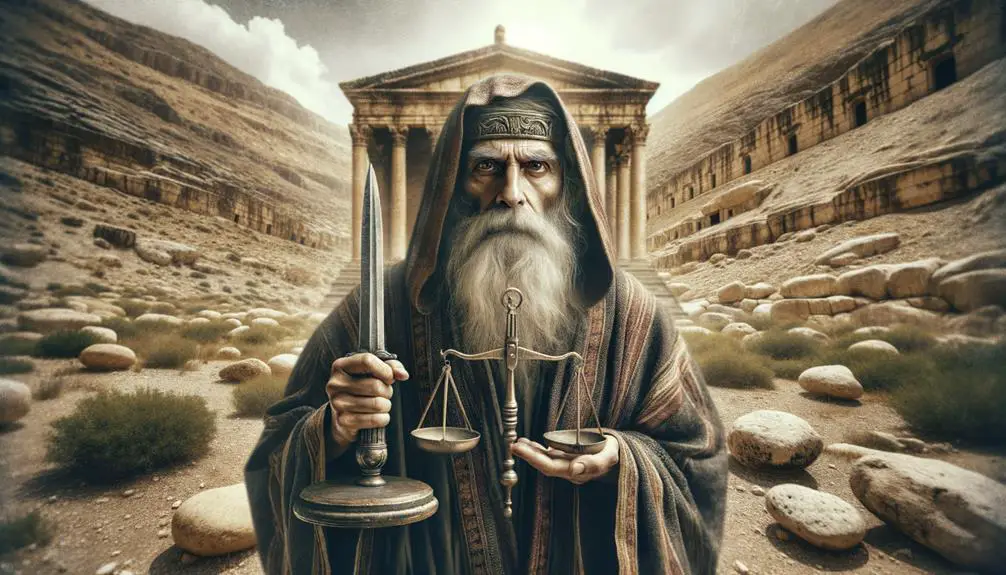
What Was a Judge in the Bible
When you think of a judge, you might picture someone in a black robe wielding a gavel, but in the biblical era, the role was drastically different. Judges weren't just legal arbiters; they were multifaceted leaders who played pivotal roles in military, spiritual, and social spheres of Israelite society.
Their selection process was unique, often involving divine intervention, setting them apart from modern-day judges. Figures like Deborah and Samson weren't just enforcing laws; they were guiding their people through tumultuous times.
As we unpack the complexities of their roles, you'll discover how their legacy extends far beyond their historical impact, shaping interpretations and understandings for centuries to come.
Key Takeaways
- Judges in the Bible were multifaceted leaders with roles in legal, military, and spiritual guidance.
- They were often chosen by divine selection and validated by communal recognition.
- Judges combined wisdom, moral integrity, and cultural stewardship to guide and shape society.
- Their legacy has influenced modern understandings of leadership, justice, and the intertwining of personal virtue and public duty.
The Historical Context
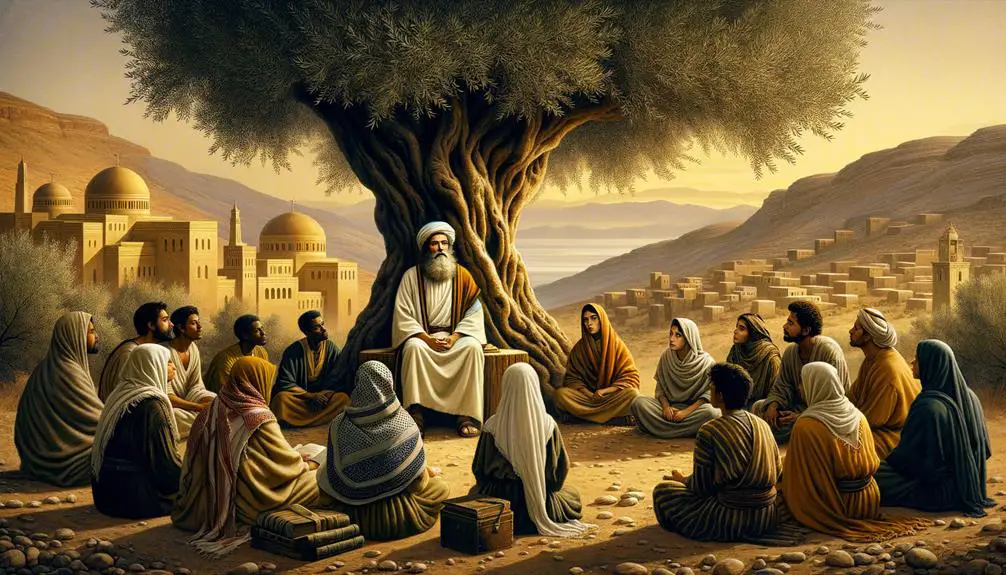
To understand the role of judges in the biblical narrative, it's crucial to delve into the historical context in which they emerged, marking a transitional period in ancient Israel's governance and societal structures. This era, often shrouded in the mists of antiquity, reveals a society grappling with the challenges of moving from a nomadic existence to a sedentary lifestyle, underscored by the need for a new form of leadership and dispute resolution. Cultural influences from surrounding nations played a pivotal role in shaping the institution of judges, as archaeological evidence suggests.
You'll find that the judges were more than just legal arbitrators; they were multifaceted leaders who wielded military, political, and spiritual authority. This amalgamation of roles reflects the syncretic nature of ancient Near Eastern societies, where the fusion of cultural norms and practices was commonplace. Archaeological evidence, including inscriptions and artifacts, provides a window into this complex societal structure, underscoring how judges functioned within it. These findings suggest that the judges' roles were adapted to meet the unique needs of their communities, influenced by the prevailing cultural and geopolitical landscapes.
Moreover, the material culture of the period, as unearthed by archaeologists, offers insights into the daily lives of the people and the challenges they faced, from external threats to internal strife. This archaeological evidence, when analyzed in conjunction with the biblical text, allows for a more nuanced understanding of the judges' roles and the cultural influences that shaped their leadership.
The Role Defined
The role of judges in ancient Israel was multifaceted, encompassing legal, military, and spiritual leadership within their communities. These individuals didn't just preside over legal disputes but also played crucial roles in guiding the Israelites through periods of crisis and ensuring adherence to societal norms and religious commandments. Their duties, deeply embedded within the fabric of ancient Israelite society, can be dissected as follows:
- Legal Authority: Judges were pivotal in interpreting and applying the laws of the land. They made critical legal interpretations, ensuring that justice was meted out according to the complex mosaic of laws, customs, and societal norms that governed daily life. Their decisions could affect everything from personal disputes to matters affecting the entire community.
- Military Leadership: In times of conflict, judges often assumed the role of military leaders. They were responsible for rallying the Israelites against external threats, strategizing battle plans, and leading their people to victory. This aspect of their role underscores their importance not just in peacetime governance but also in securing the physical safety and sovereignty of their communities.
- Spiritual Guidance: Beyond their legal and military duties, judges also served as spiritual leaders. They reminded the Israelites of their covenant with God, encouraging adherence to religious laws and practices. Their leadership was instrumental in maintaining the moral and spiritual fabric of society, acting as intermediaries between the divine and the earthly realms.
In essence, judges in ancient Israel stood at the confluence of legal, military, and spiritual spheres, shaping the trajectory of their society while navigating its complex legal interpretations and societal norms.
Selection Process
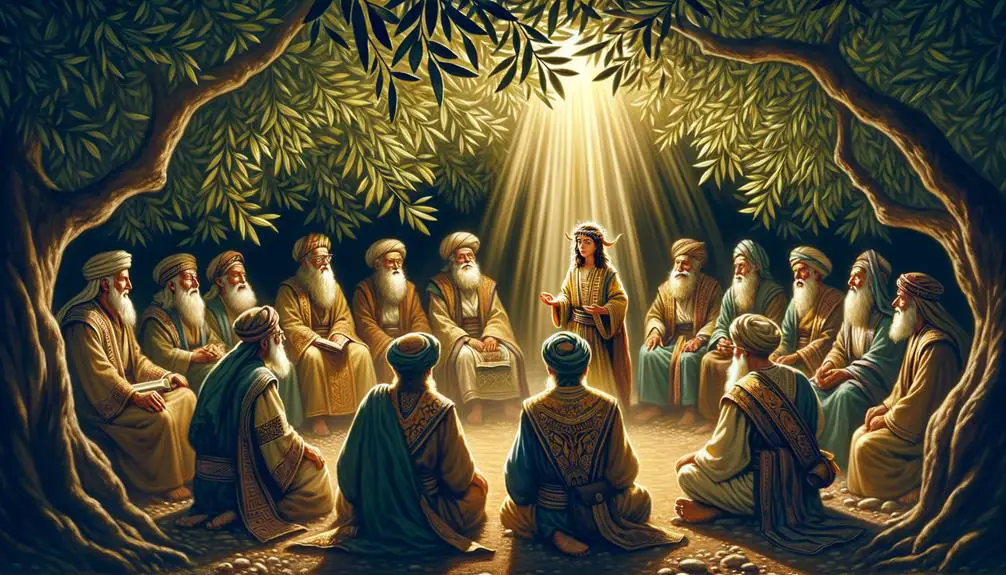
Understanding how judges were selected in ancient Israel requires delving into a nuanced process that blended divine selection with communal recognition. The appointment of a judge wasn't merely about fulfilling a role; it was about discerning and acknowledging those whom God had already chosen. This dual aspect of the selection process ensures a fascinating interplay between divine sovereignty and human agency.
Aspect |
Description |
|---|---|
Divine Selection |
Judges were often called by God, receiving a direct commission or sign that they were chosen for the role. |
Communal Recognition |
Local communities recognized and validated the judge's authority, often following divine signs or proven leadership. |
Judicial Qualifications |
Integrity, wisdom, and a deep understanding of the law were paramount. Judges were expected to embody these traits. |
Appointment Criteria |
Beyond spiritual calling, criteria included the ability to lead, make just decisions, and command respect. |
This process wasn't codified in a rigid manner but rather emerged from the societal and spiritual context of the time. The judicial qualifications were as much about character and divine favor as about knowledge or strategic acumen. Appointment criteria, while implicitly understood, prioritized a judge's capacity to act as God's instrument of justice and leadership.
In this context, you'll notice that selection was far from arbitrary. It required a confluence of divine indication and human discernment, ensuring that those chosen to judge were not just willing but profoundly capable. This intricate balance between divine appointment and communal acceptance underscores the unique nature of leadership and justice in ancient Israel, setting a precedent for understanding the complex nature of authority and its divine-human interplay.
Notable Figures
Reflecting on the intricate selection process of judges in ancient Israel leads us directly to the examination of notable figures who embodied these criteria and left indelible marks on the nation's history and spiritual legacy. These judges weren't merely arbiters of legal disputes but were pivotal in shaping the moral and cultural fabric of their society. Their characteristics and cultural influence are crucial to understanding the multifaceted role they played.
- Leadership and Wisdom: The judges were lauded for their wisdom and leadership. They possessed an unparalleled ability to discern right from wrong, making judgments that not only resolved conflicts but also guided the moral compass of the nation. This wisdom often stemmed from a profound spiritual insight, marking them as leaders who could navigate the complexities of governance and spiritual stewardship with equal adeptness.
- Moral Integrity: Integrity was non-negotiable. The judges' reputations for honesty and moral fortitude set them apart, establishing a standard of conduct that permeated through society. They were seen as incorruptible, a trait that bolstered their authority and the respect they commanded from the populace.
- Cultural Stewards: The judges played a pivotal role in preserving and transmitting cultural values and religious observances. Their judgments weren't solely legal decrees but also reflections of the societal ethos, serving to reinforce the cultural identity of the nation. Through their actions and decisions, they shaped the spiritual narrative, weaving it into the everyday life of the people.
These characteristics underscore the profound influence judges had, not only in judicial matters but also in the cultural and spiritual life of ancient Israel.
Military and Spiritual Leadership
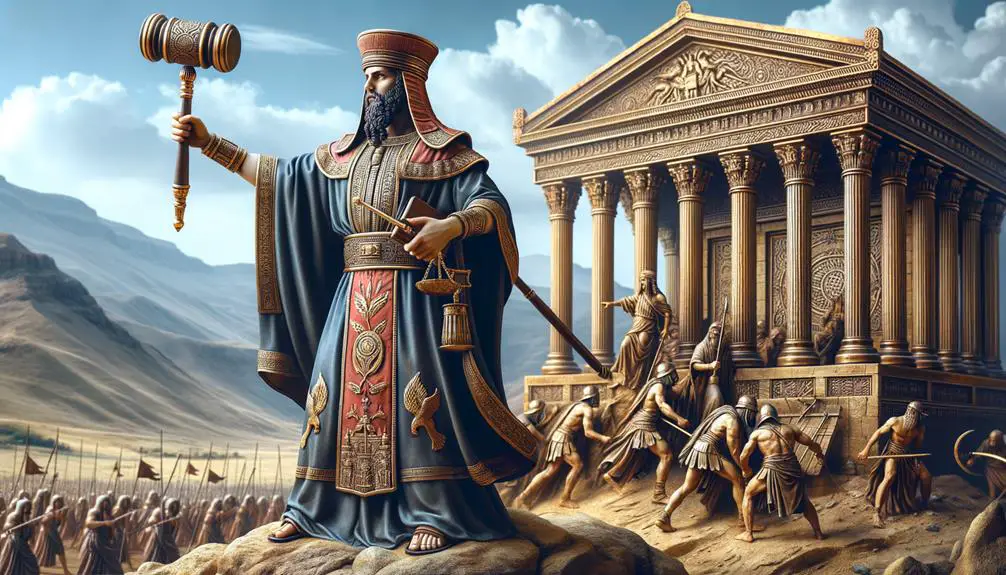
You must understand that in the historical context of the Judges, their roles in battle weren't merely tactical but also deeply intertwined with spiritual leadership. They guided their people through faith, leveraging divine mandates to rally and lead in times of conflict.
This dual role underscores a complex interplay between religious conviction and military strategy, shaping the narrative of leadership in ancient Israelite society.
Roles in Battle
In the biblical narrative, judges played pivotal roles in both military and spiritual leadership, guiding Israel through periods of conflict and spiritual renewal. Their roles in battle were multifaceted, encompassing:
- Development of Battle Strategies: Judges were instrumental in formulating strategies that leveraged both the terrain and the unique strengths of Israelite forces. They analyzed enemy formations and devised tactical plans to counteract them effectively.
- Conducting Enemy Negotiations: Prior to engaging in open conflict, judges often sought to negotiate with enemy leaders. This approach aimed to resolve disputes diplomatically, preserving resources and lives.
- Directing Troops in Combat: When negotiations failed, judges led their troops into battle, demonstrating valor and strategic acumen. Their leadership on the battlefield was pivotal in securing victories for Israel, often against overwhelming odds.
Guidance Through Faith
Beyond their tactical prowess in battle, judges also excelled in guiding the Israelites through faith, intertwining military and spiritual leadership to navigate periods of turmoil. This dual role required not only strategic acumen but also a profound connection to a higher power, ensuring their decisions aligned with divine will.
Judges' ability to make faithful decisions during crises underscored their spiritual resilience, serving as a beacon for the Israelite community. Their leadership went beyond mere military victories; it encompassed moral guidance and a commitment to uphold the covenant between the Israelites and God.
In doing so, judges fortified the spiritual fabric of their society, demonstrating that true leadership is anchored in faith and moral integrity.
Impact on Israelite Society
The judges of ancient Israel wielded significant influence over the societal structure, guiding the Israelites through periods of turmoil and providing a foundation for both legal and moral order. Their roles were pivotal, not just in adjudicating disputes, but in shaping the very fabric of Israelite society. Delving into their impact, one observes profound effects on social dynamics and economic influence, which were instrumental in the development and cohesion of ancient Israel.
- Social Dynamics: Judges played a crucial role in resolving conflicts and maintaining social harmony. They were seen as God's representatives, blending spiritual authority with judicial governance. This unique position allowed them to influence social norms and values, fostering a sense of community and mutual responsibility among the Israelites. Their decisions often reflected and reinforced societal values, guiding the people in adhering to a moral and ethical code that was seen as divinely ordained.
- Economic Influence: The economic landscape of ancient Israel was significantly impacted by the judges. Through their rulings, they could influence property rights, inheritance laws, and transactions, thereby shaping the economic interactions within the society. Their judgments could alter the distribution of wealth and resources, ensuring economic justice and preventing the accumulation of wealth in the hands of a few.
- Leadership and Stability: In times of external threat or internal discord, judges acted as military leaders and arbiters of peace. Their leadership ensured the survival and stability of Israelite society, navigating it through periods of crisis with a combination of military acumen and judicial wisdom.
The judges, therefore, were pivotal in molding Israelite society, guiding it through its formative years with a blend of judicial authority, moral leadership, and economic oversight.
Legacy and Interpretations
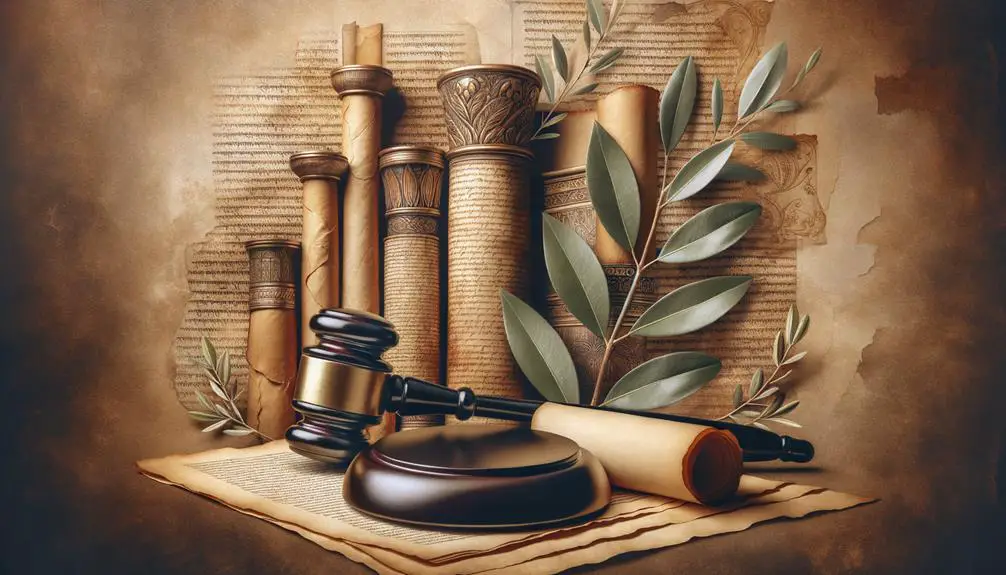
Numerous scholars have meticulously analyzed the enduring legacy and diverse interpretations of the biblical judges, revealing their complex role in shaping not only ancient Israelite culture but also modern understandings of leadership and justice. You'll find that their stories, steeped in moral and ethical dilemmas, resonate with contemporary themes of governance, law, and morality, highlighting their modern relevancy.
In your exploration of this topic, you'll uncover that the judges aren't merely historical figures but serve as archetypes in the discourse on divine justice versus human law. Their narratives have been adapted across cultures, influencing literature, art, and legal philosophy. These cultural adaptations underscore the judges' multifaceted legacy, demonstrating their ability to transcend time and geography.
You'll also observe that interpretations of the judges' actions and decisions vary widely, from heroic champions of faith to flawed individuals grappling with their humanity. This spectrum of perspectives enriches the dialogues around authority, ethics, and the nature of leadership. Scholars have pointed out that these stories encourage a critical examination of the intertwining of personal virtue and public duty.
Moreover, the judges' enduring significance is evident in modern legal and theological debates. Their example prompts you to question and redefine the parameters of justice, leadership, and moral responsibility in today's world. As you delve deeper, you'll appreciate how the ancient narratives of the judges continue to challenge and inspire contemporary society, proving their timeless relevancy and impact on cultural identity and legal ethics.
Frequently Asked Questions
How Did the Concept of Judges in the Bible Influence Modern Legal Systems?
You'll find that the concept of judges in the Bible greatly influenced modern legal systems through the establishment of legal precedents and judicial ethics.
These ancient narratives provided a foundational understanding of justice and law enforcement, shaping the moral and ethical framework within which today's judges operate.
Their stories underscore the importance of fairness, wisdom, and integrity, principles that continue to guide judicial conduct and decision-making in contemporary courts.
Are There Any Archaeological Findings That Directly Support the Existence of Specific Judges Mentioned in the Bible?
You might think it's all myths, but archaeological methods have indeed provided evidence supporting the existence of specific judges mentioned in the Bible.
By tracing Judges' ancestry and examining ancient artifacts, scholars have pieced together a compelling narrative.
This approach hasn't only validated some of the historical accounts but also enriched our understanding of the period.
Clearly, the past isn't as elusive as one might assume when we dig deep enough.
How Are the Judges in the Bible Depicted in Other Religious Texts or Traditions Outside of Judaism and Christianity?
In Islamic perspectives, biblical judges are often revered as prophets or righteous leaders, blending their narratives with Quranic teachings. Mythological comparisons further illuminate their roles, drawing parallels with figures in other faiths who embody justice and divine guidance.
These cross-cultural depictions enrich our understanding, showing how the judges' moral and spiritual leadership transcends religious boundaries, offering insights into their universal appeal and the values they represent across various traditions.
What Are the Most Significant Differences Between the Judges in the Bible and the Prophets in Terms of Their Roles and Functions?
In the tapestry of biblical narratives, you'll find judges and prophets woven with distinct threads. Judges were primarily military leaders, tasked with delivering Israel from its oppressors. They didn't just wield swords; they wielded justice, albeit in a more earthly realm.
Prophets, on the other hand, served as conduits for divine prophetic messages. Their battlefield was the human heart, urging repentance and foretelling consequences. Analyzing their roles reveals a nuanced differentiation in divine intervention strategies.
How Has the Portrayal of Judges in the Bible Been Interpreted or Reimagined in Contemporary Literature and Media?
In contemporary literature and media, judges from the Bible have been reimagined in various ways. Literary adaptations often explore their moral complexities, while media portrayals sometimes amplify their heroic traits.
These reinterpretations delve into the judges' ethical dilemmas and leadership challenges, offering a nuanced view that contrasts with traditional biblical narratives. By doing so, they invite you to reconsider these figures within the modern context, highlighting their enduring relevance and complexity.
Conclusion
In the tapestry of biblical history, judges were the weavers, intertwining the threads of military might and spiritual guidance.
You've seen how they were chosen, not just for their prowess in battle but for their ability to discern the divine.
Figures like Deborah and Samson were more than mere leaders; they were the embodiment of Israel's struggle and resilience.
Their legacy, a complex allegory of leadership, reflects the enduring quest for balance between the temporal and the spiritual in the human saga.


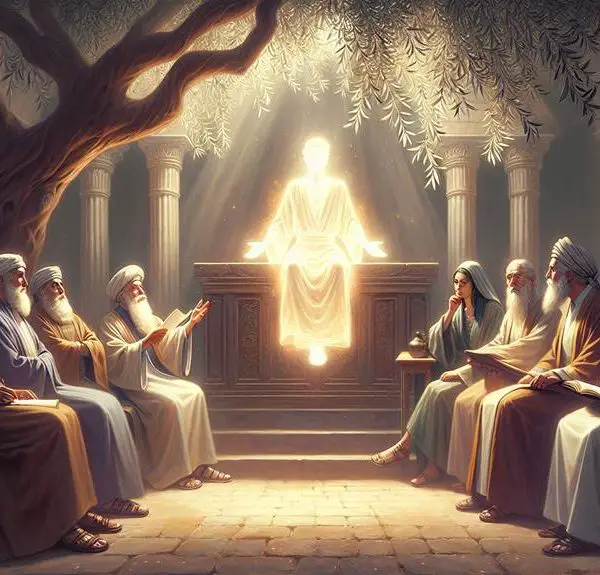
Sign up